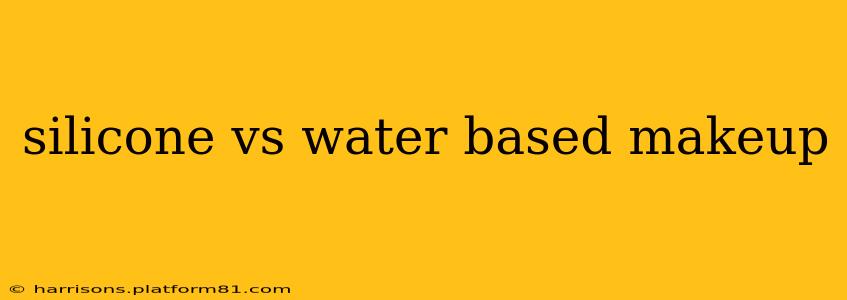Choosing the right makeup can feel like navigating a minefield. With so many options and formulations, understanding the differences between key ingredients is crucial for achieving a flawless look and maintaining healthy skin. This comprehensive guide delves into the world of silicone-based and water-based makeup, highlighting their pros, cons, and ideal uses.
What is Silicone-Based Makeup?
Silicone-based makeup utilizes silicone polymers as key ingredients. These polymers create a smooth, silky texture that often feels luxurious on the skin. They're known for their ability to create a blurring effect, minimizing the appearance of pores and fine lines. This makes them particularly popular for creating a flawless, airbrushed finish. Common silicone ingredients include dimethicone, cyclomethicone, and phenyl trimethicone.
Pros of Silicone-Based Makeup:
- Smooth, flawless finish: Silky texture creates a blurring effect, minimizing imperfections.
- Long-lasting wear: Often provides excellent staying power throughout the day.
- Water-resistant: Provides better protection against sweat and humidity.
- Feels luxurious on the skin: Many find the application and feel of silicone-based makeup to be very comfortable.
Cons of Silicone-Based Makeup:
- Can clog pores: The heavy texture can potentially contribute to breakouts, particularly for those with acne-prone or sensitive skin.
- May feel heavy on the skin: Some individuals find the texture too heavy or greasy for their liking.
- Difficult to remove: Requires a strong makeup remover to effectively cleanse the skin.
- May build up on the skin: Accumulation over time can lead to clogged pores and breakouts.
What is Water-Based Makeup?
Water-based makeup uses water as its primary solvent. This typically results in a lighter, more breathable formula that's often preferred by individuals with sensitive or oily skin. Water-based makeup tends to feel less heavy and greasy compared to silicone-based alternatives.
Pros of Water-Based Makeup:
- Lightweight and breathable: Feels less heavy and greasy on the skin.
- Less likely to clog pores: Generally better suited for acne-prone or sensitive skin.
- Easier to blend: Often blends seamlessly into the skin for a natural look.
- Often contains more skincare ingredients: Many water-based formulations incorporate beneficial skincare ingredients like antioxidants and hydrating agents.
Cons of Water-Based Makeup:
- May not be as long-lasting: Water-based formulas typically have shorter wear times compared to silicone-based alternatives.
- Less coverage: May offer less coverage, potentially requiring more product to achieve the desired look.
- Can be affected by humidity: May be more susceptible to smudging or fading in humid conditions.
Which Type of Makeup is Best for My Skin Type?
The best type of makeup ultimately depends on your individual skin type and preferences:
- Oily or Acne-Prone Skin: Water-based makeup is generally recommended due to its lightweight, breathable formula, which is less likely to clog pores.
- Dry or Mature Skin: Silicone-based makeup can provide more hydration and a smoother, more youthful appearance. However, it's essential to choose a formula that isn't too heavy.
- Combination Skin: You may be able to use both types of makeup, depending on the specific area of your face. For example, you might use a water-based foundation on your oily t-zone and a silicone-based concealer for under-eye coverage.
- Sensitive Skin: Opt for water-based makeup with minimal ingredients and fragrances to minimize the risk of irritation. Look for formulations specifically designed for sensitive skin.
How Do I Remove Silicone-Based Makeup?
Removing silicone-based makeup requires a stronger cleanser than what's typically needed for water-based makeup. Oil-based cleansers or makeup remover balms are highly effective at breaking down the silicone polymers and thoroughly cleaning the skin. Always follow up with a gentle cleanser to ensure complete removal.
Does Silicone-Based Makeup Cause Breakouts?
While not inherently pore-clogging for everyone, silicone-based makeup can contribute to breakouts in individuals with acne-prone or sensitive skin. The heavier texture can potentially trap oil and dirt, leading to clogged pores and inflammation. The potential for breakouts is also heightened if the makeup isn't removed thoroughly.
Is Water-Based Makeup Better for Sensitive Skin?
Generally, yes. Water-based makeup is typically considered gentler on sensitive skin because it's lightweight, breathable, and less likely to clog pores. However, always check the ingredient list for potential irritants and opt for fragrance-free formulations whenever possible.
This guide provides a comprehensive overview of the differences between silicone-based and water-based makeup. By understanding the characteristics of each type, you can make an informed decision to achieve a flawless look while maintaining the health and well-being of your skin. Remember to always patch test new products before applying them to your entire face.
